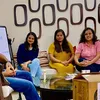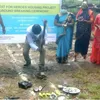This Bengaluru NGO works on all 17 UN SDGs across India based on the need of the hour
Amidst the COVID-19 pandemic, i Love To Care (India) Charitable Trust is focusing on distributing meals to crematorium workers. It has also created a dashboard for verified COVID-19 leads.
The United Nations Sustainable Development Goals (SDGs) lists out 17 SDGs, which countries globally need to work on for the collective improvement of the world.
To help governments achieve these goals, several NGOs focus their efforts on improving some of these SDGs.
However, Bengaluru-based i Love To Care (India) Charitable Trust focuses on achieving all the 17 UN SDGs in a concentrated effort. The NGO unites volunteers from different demographics and walks of life to carry out these goals as and when necessitated.

Some of the team members at a book distribution drive in Bengaluru
“We take pride in saying that we focus on all 17 UN SDGs. We focus on the time invested in achieving these goals rather than raising funds,” says Anand G. Padmanabhan, Chairman of i Love To Care (India) Charitable Trust.
In a conversation with SocialStory, Anand and Nandini Jaganath, President of the NGO, talk about their journey and the experiences in executing the goals of the NGO.
Foundation
“Back in 2016, when my children were going to school in Dubai, they learned a lot about social work. But there was a huge gap — most of this social work was theory and not in practice,” says Anand.
“So we decided to give a helping hand to the school. We partnered with the parents to take the children out on the weekends since they were swamped with the regular curriculum on weekdays. This group of parent and student volunteers came to be known as ‘i Love Care’ in Dubai,” he adds.
In 2017, a similar organisation was started in India, which grew with every passing month, and is registered as i Love To Care (India) Charitable Trust. So far, the trust has 1,000 volunteers across the country.
At present, the NGO has collaborated with Rotary Bangalore Centennial and the Ramaiah Institute Of Technology, Bengaluru.

The different SDGs and the projects that have been done so far. While most of the projects fall into various categories, three goals have seen concrete projects.
The charitable trust uses NITI Aayog’s report — made from a dashboard that collects data on various SDGs and identifies which Indian states and UTs have fallen behind — to help them work towards those specific goals.
“We implement the need of that particular state or UT at the time and focus on the need of the hour rather than doing all 17 at the same time. Moreover, rather than focusing on two or three specific SDGs, we want to help states on any cause that needs attention,” Anand explains.
At present, the NGO primarily concentrates its work around Bengaluru, Hubli, Mysore, and Chennai. It has initiated the work in Karnataka and Tamil Nadu and will be expanding to other Indian states and UTs in the coming months.
Activities so far

Seed ball making project
“We had a street play in one of the busiest areas of Basaveshwarnagar, Bengaluru, where we distributed cotton bags to the vendors who could distribute the same to customers. We continue to distribute these bags every time we visit so that we can impact a change whether the customers bring bags or not,” says Nandini Jaganath, President of the trust.
Besides, the NGO has conducted activities, including blanket donation drives, breast cancer awareness campaigns, book donation drives, craft sessions for underserved children, seed ball making projects, etc.
Through the Industry 4.0 initiative, the NGO trains students from middle school to university in different subject matter, including AR, AI, VR, etc., which will help them in the coming years. In fact, it also encourages their startup ideas and engages chartered accountants and angel investors to help them put their ideas into action.
Helping during the pandemic
Amidst the COVID-19 pandemic, in February 2020, the trust started distributing masks and sanitisers and created awareness regarding the correct method of handwashing in various slums in and around Bengaluru.
It also conducted panel discussions with doctor-volunteers of the group, including Ayurveda specialists, paediatricians, etc., to better understand the disease.
“In the second wave, we have been providing three meals a day to 13 crematoriums in Bengaluru. These meals are provided to all 300 workers in these crematoriums,” says Nandini.
In fact, the NGO has partnered with SNC Lavalin Group and Happy World Foundation for its meal distribution drive. Happy World Foundation helps in picking up and distributing the food.

Some of the volunteers distributing food to the crematorium workers
The SNC Lavalin Group provides funds through its CSR initiative. However, Anand says the funds haven’t been used yet as it is utilising an amount of Rs 6 lakh from individual donations for the same now.
Aarogya Aahara — a Bengaluru-based centralised kitchen — prepares the meals and charges Rs 35 for breakfast, Rs 70 for lunch, and Rs 35 for dinner to the NGO. The trust manages the funds for this initiative.
It has launched a fundraiser campaign on the crowdfunding platform Milaap for the same and accepts individual donations, too.
Additionally, it has created a dashboard with verified COVID-19 leads for people looking for oxygen cylinders, hospital beds, plasma donors, and other essential medical resources, including crematorium needs.
The NGO is one among five others that have partnered with the BBMP to carry out the crematorium management. About nine volunteers from the NGO are available 24x7 for this service. The team helps arrange the logistics to the crematoriums in Bengaluru.
“We are also conducting a blood donation campaign, catering to youngsters before they get vaccinated. Many students have approached us and donated blood at various collection centres,” says Nandini.
Challenges and way forward
For the NGO, handling misinformation during these difficult times have been difficult. It is solving this through the dashboard, which is presently working in Bengaluru, and will be extended to Chennai, Mysuru, and Hubli.
Talking about the road ahead, Anand says, “Right now, we’re focusing on the current COVID-19 situation, but we are also focussed on how to pursue the 17 SDG goals. We are also looking to help other NGOs and support them in pursuing their initiatives. We also want to aid corporates in choosing a particular goal for their CSR and help them execute it in any Indian state.”
The NGO is looking to improve the healthcare infrastructure with initiatives like ‘Doctor on Wheels,’ and help the COVID-19 patients, as well as work on the mental health and well-being of these patients.
“We also want to have a branch office in every Indian state and UT and help more people across the country,” Anand adds.
Edited by Suman Singh









